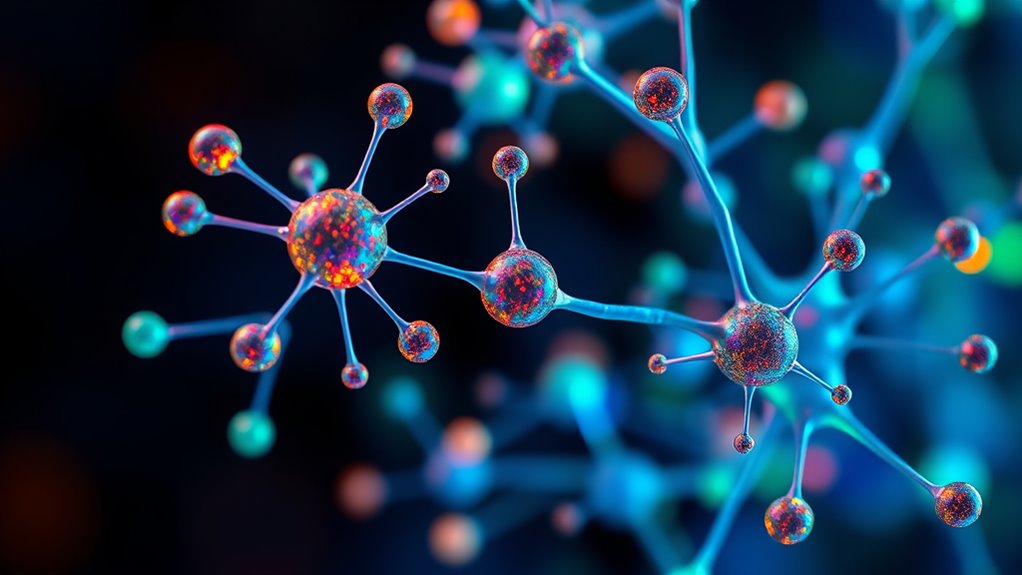Neurotransmitters are tiny molecules that act as your brain’s chemical messengers, shaping your mood and memory by passing signals across neurons. They’re created from amino acids obtained through your diet, stored in vesicles, and released into the synaptic gap to bind with specific receptors. These interactions determine how you feel, think, and remember. Disruptions can cause mental health issues or cognitive problems. Keep exploring to understand how these molecules finely tune your mental landscape.
Key Takeaways
- Neurotransmitters transmit signals between neurons, affecting mood, memory, and overall brain function.
- Their synthesis from dietary precursors like tryptophan and tyrosine influences mental health.
- Released neurotransmitters bind to specific receptors, triggering neural responses that shape thoughts and emotions.
- Disruptions in receptor interactions can lead to mental health issues and cognitive impairments.
- Proper neurotransmitter function is essential for maintaining balanced mood and sharp memory.

Have you ever wondered how your brain communicates complex thoughts and emotions so seamlessly? It all comes down to tiny molecules called neurotransmitters that transmit signals across your nervous system. These molecules are essential for everything from mood regulation to memory formation. Understanding how they’re produced and how they interact with your brain’s receptors can shed light on the intricate processes that govern your mental states.
Neurotransmitters relay thoughts and emotions through precise chemical interactions in your brain.
Neurotransmitter synthesis is the process by which your brain creates these chemical messengers. It begins with precursors—specific nutrients or amino acids obtained from your diet—that are converted into active neurotransmitters through a series of enzymatic reactions. For example, the amino acid tryptophan is transformed into serotonin, a neurotransmitter closely linked to mood stability. Similarly, tyrosine is converted into dopamine, which influences motivation and pleasure. Proper synthesis is vital for maintaining mental health and overall brain function, as it depends on both your diet and enzymatic activity.
Once synthesized, neurotransmitters are stored in tiny vesicles within your nerve cells. When your brain needs to send a message, these vesicles fuse with the nerve cell membrane, releasing their contents into the synaptic cleft—the tiny gap between neurons. From there, the neurotransmitters travel across the synapse to bind with specific receptors on the neighboring neuron.
This is where receptor interactions become critical. Each receptor is like a lock designed to fit a particular key—the neurotransmitter. When the neurotransmitter binds to its receptor, it triggers a cascade of electrical and chemical signals that influence how the receiving neuron fires. These interactions determine whether the message is amplified, dampened, or modified, shaping your mood, thoughts, and memories. The specificity of receptor interactions ensures precise communication within your brain and allows for complex signaling pathways to operate efficiently.
The specificity of receptor interactions ensures precise communication within your brain. Different receptors respond to different neurotransmitters, allowing for a highly organized signaling system. For instance, GABA receptors respond to the inhibitory neurotransmitter GABA, helping to calm neural activity and promote relaxation. Meanwhile, glutamate, the primary excitatory neurotransmitter, interacts with its receptors to enhance neural firing, essential for learning and memory.
Disruptions in receptor interactions—whether through genetic mutations, drug interference, or disease—can lead to mental health issues, cognitive decline, or neurological disorders. These disruptions can alter the delicate balance of neural activity, affecting overall brain function and behavior.
In essence, your brain’s remarkable ability to process complex information hinges on the delicate dance of neurotransmitter synthesis and receptor interactions. These tiny molecules and their precise bindings form the foundation of your mental landscape, guiding your mood, memories, and perception of the world around you.
Frequently Asked Questions
How Do Neurotransmitters Affect Hormone Production?
Neurotransmitters influence hormone production through their role in neurotransmitter synthesis and hormonal regulation. When they bind to receptors on endocrine glands, they trigger signals that regulate hormone release.
You can think of neurotransmitters as messengers that communicate with your body’s hormone-producing organs, ensuring proper hormonal balance. This process helps control mood, stress, and other crucial functions, highlighting how tiny molecules have a big impact on overall health and well-being.
Can Neurotransmitter Imbalances Cause Physical Health Issues?
You’re right to wonder if neurotransmitter imbalances can cause physical health issues. When your brain’s chemistry gets out of whack, it can throw off your stress response and sleep regulation, leading to fatigue, anxiety, or even immune problems.
Think of it as a domino effect—disrupt one part, and others follow. Maintaining balanced neurotransmitters supports overall health, helping your body respond better to daily stresses and sleep needs.
How Do Drugs Alter Neurotransmitter Activity?
Drugs alter neurotransmitter activity by affecting synthesis and receptor sensitivity. They can increase or decrease neurotransmitter production, influencing how much is available in your brain.
Some enhance receptor sensitivity, making neurons more responsive, while others block receptors, preventing signals.
These changes can impact mood, memory, and behavior. By tweaking these processes, drugs can effectively modify your brain’s communication system, leading to the desired or unintended effects on your mental state.
Are Neurotransmitter Levels Influenced by Diet?
Imagine your brain as a delicate symphony—neurotransmitter levels can be influenced by what you eat. Yes, your diet matters; consuming food sources rich in amino acids, vitamins, and minerals can boost neurotransmitter production.
Dietary supplements may also help, but focus on balanced meals with protein, fruits, and vegetables. By nourishing your body, you support the harmony of your brain’s chemistry, impacting your mood and memory naturally.
What Role Do Genetics Play in Neurotransmitter Function?
Genetics play a significant role in neurotransmitter function through genetic variations and inheritance patterns. These variations can affect how your body produces, processes, and responds to neurotransmitters, influencing mood and memory.
If you inherit certain genetic traits, you might have differences in neurotransmitter levels or receptor sensitivity. Understanding your genetic makeup helps explain individual differences and can guide personalized approaches to mental health treatments.
Conclusion
As you unravel the secrets of neurotransmitters, you realize they’re like tiny maestros conducting the symphony of your mind. Each molecule’s whisper and roar shape your mood and memories, weaving an intricate tapestry of experience. Understanding these microscopic messengers empowers you to grasp the delicate balance within your brain’s orchestra. With this knowledge, you hold the key to releasing emotional harmony and releasing the profound depths of your own mind’s melody.









